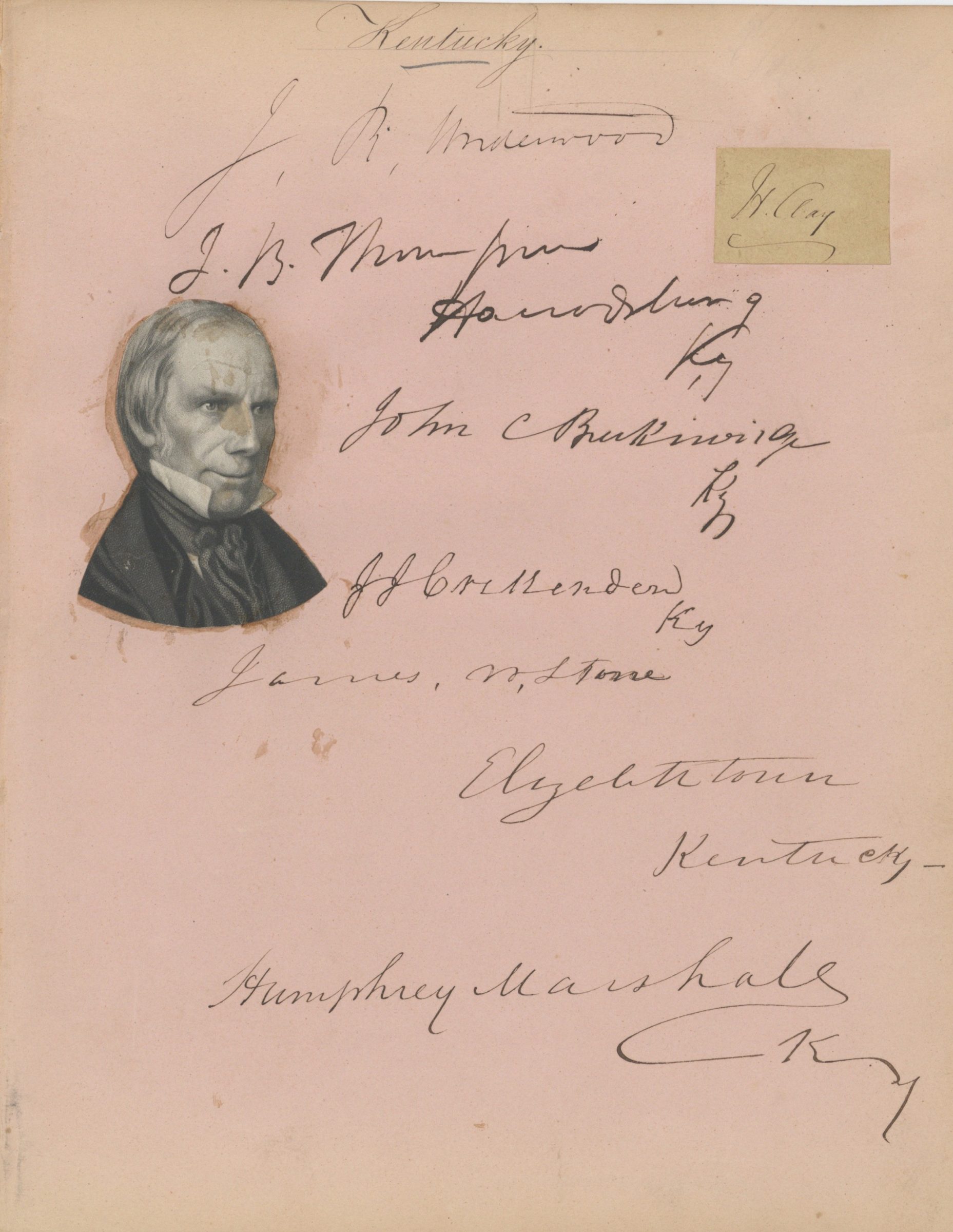Kentucky on the Brink of the Civil War: An Album Consisting of That Entire Border State’s Delegation During the Era of the Compromise of 1850 and the Kansas-Nebraska Act




Among the signers were future Vice President John C. Breckenridge, who was also Presidential candidate in the election of 1860, and a relation of Mary Todd Lincoln's; and John J. Crittenden, a long time public servant
- Currency:
- USD
- GBP
- JPY
- EUR
- CNY
The 32nd and 33rd Congresses served from 1851-1855. The 32nd Congress met after the Compromise of 1850 and the 33rd passed the Kansas–Nebraska Act, an act that soon led to the creation of the Republican Party. This was a consequential Congress and border states like Kentucky were on the edge of a...
The 32nd and 33rd Congresses served from 1851-1855. The 32nd Congress met after the Compromise of 1850 and the 33rd passed the Kansas–Nebraska Act, an act that soon led to the creation of the Republican Party. This was a consequential Congress and border states like Kentucky were on the edge of a precipice they could vaguely see looming ahead. Kentucky’s delegation was composed of prominent politicians in a state that boasted the citizenry of Henry Clay. Among the men who sat in the House and Senate were to be Union men, Presidential candidates and Confederate generals – Democrats, Whigs and others.
During the 32nd Congress, someone met the entire Congressional Delegation of Kentucky, consisting of all 10 members of the House, as well as 3 Senators who would serve at one point or another during the two Congresses, but were present on Capitol Hill during that time.
This is a document signed by all of them, no date but almost certainly late in the 32nd Congress, and for generations was part of the same private collection. Two of the signers had died by 1854. The Clay signature is a reproduction.
Linn Boyd (D)
Richard H. Stanton (D) – At the beginning of the Civil War Stanton was arrested and held at Camp Chase in Columbus, Ohio for supporting secession.
Addison White (W) – His father was the richest man in America at that time.
William Thomas Ward (W) – With the outbreak of the Civil War, Ward was commissioned as a brigadier general in the Union Army, serving throughout the war.
Presley Ewing (W) – He died at the age of 32. His autograph is uncommon
Senator Joseph R. Underwood (W) – Underwood manumitted his slaves and sent them to Liberia, and also urged others to do likewise. He supported the Compromise of 1850 and opposed secession, though his sons supported it.
Senator John Burton Thompson (KN) – A former Whig, he was elected as a Know-Nothing.
John C. Breckinridge (D) – He came in second to Abraham Lincoln in electoral votes in the election of 1860. He had been Vice President under President James Buchanan.
Senator John J. Crittenden (W) – He served as United States Attorney General in the administrations of William Henry Harrison, John Tyler, and Millard Fillmore. He was also the 17th governor of Kentucky and served in the state legislature. Crittenden was elected to the United States House of Representatives in 1861, and supported the Union. However, he criticized many of the policies of President Abraham Lincoln and the U.S. Congress, including the Emancipation Proclamation and the admission of West Virginia to the Union.
James W. Stone (D)
Humphrey Marshall (W) – Four-term antebellum United States Congressman, a brigadier general in the Confederate States Army and a Confederate Congressman
John Calvin Mason (D) – Served as a delegate to the 1860 Democratic National Convention at Charleston, South Carolina. He also served as presidential elector on the Democratic ticket of Douglas and Johnson in 1860.
Benjamin E. Grey (W)
An interesting and uncommon set of signatures, obtained at a crucial time in American history.

Frame, Display, Preserve
Each frame is custom constructed, using only proper museum archival materials. This includes:The finest frames, tailored to match the document you have chosen. These can period style, antiqued, gilded, wood, etc. Fabric mats, including silk and satin, as well as museum mat board with hand painted bevels. Attachment of the document to the matting to ensure its protection. This "hinging" is done according to archival standards. Protective "glass," or Tru Vue Optium Acrylic glazing, which is shatter resistant, 99% UV protective, and anti-reflective. You benefit from our decades of experience in designing and creating beautiful, compelling, and protective framed historical documents.
Learn more about our Framing Services














































































































